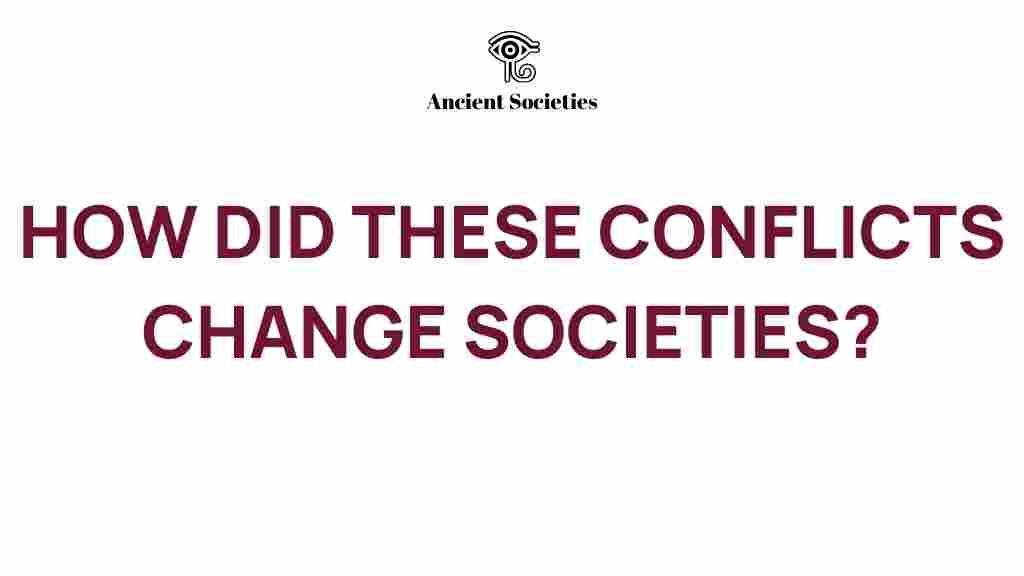Unraveling the Impact: How Conflicts Reshape Societies
Throughout history, conflicts have played a pivotal role in shaping societies. The consequences of wars, revolutions, and strife have led to significant societal change, influencing cultural evolution and altering social dynamics. Understanding the historical impact of these conflicts is essential for grasping how societies transform over time. This article explores the intricate relationships between conflicts and societal change, highlighting the various ways in which wars and disputes have reshaped the world.
Understanding the Historical Impact of Conflicts
Conflicts arise from a multitude of factors, including political, economic, social, and cultural grievances. The consequences of these conflicts extend far beyond the battlefield, affecting every aspect of life. The following sections delve into the historical impact of conflicts and how they have driven societal change.
The Nature of Conflicts
Conflicts can take many forms, including:
- Military Conflicts: Wars between nations or groups that often lead to significant loss of life and changes in borders.
- Civil Conflicts: Internal struggles within a country that can lead to regime change or social upheaval.
- Ethnic Conflicts: Disputes between different ethnic groups that can result in violence and social fragmentation.
- Ideological Conflicts: Clashes based on differing beliefs, such as political ideologies or religious views.
Case Studies of Societal Change Due to Conflicts
Examining historical case studies provides valuable insight into how conflicts have shaped societies. Let’s take a look at a few notable examples:
World War II and Its Aftermath
World War II was one of the most transformative conflicts in history. The war resulted in the deaths of millions and led to significant political and social changes worldwide:
- Political Restructuring: The creation of the United Nations aimed to prevent future conflicts and promote peace.
- Social Movements: The war catalyzed movements for civil rights and decolonization around the globe.
- Economic Changes: The post-war economic boom and the establishment of international trade agreements reshaped global economies.
The American Civil War
The American Civil War (1861-1865) was a pivotal moment in U.S. history that led to profound societal change:
- Abolition of Slavery: The war resulted in the end of slavery, fundamentally altering social dynamics in the United States.
- Reconstruction Era: The post-war period saw efforts to integrate formerly enslaved people into society, which had lasting implications for race relations.
- Federal vs. State Power: The war established federal authority over states, changing the balance of power in the U.S.
Societal Change: Mechanisms of Transformation
Conflicts can lead to societal change through various mechanisms. Understanding these can provide insights into how societies evolve in response to strife:
1. Cultural Evolution
Conflicts often lead to cultural evolution, as societies are forced to adapt to new realities. For example, after World War II, many countries embraced modernist movements in art and literature as they reconciled with the horrors of war.
2. Changes in Social Structures
Wars and conflicts can disrupt established social hierarchies, leading to shifts in power dynamics. For instance:
- Women often gain more rights and responsibilities during and after conflicts, as seen in many societies post-war.
- Ethnic and racial minorities may gain visibility and rights in the aftermath of conflicts that challenge the status quo.
3. Economic Transformation
Conflicts can also lead to significant economic changes. During wartime, economies often shift from peacetime production to military production, which can have long-term effects:
- Post-war reconstruction can lead to economic booms, as seen in Europe after World War II.
- Conversely, some regions suffer long-term economic decline due to the devastation of conflict.
Conflict Resolution: Pathways to Peace
While conflicts often lead to societal change, effective conflict resolution can minimize negative impacts and promote healing. Here are some strategies for conflict resolution:
1. Dialogue and Negotiation
Open communication between conflicting parties can lead to mutual understanding and compromise. Initiatives like peace talks or mediation can help resolve disputes without further violence.
2. Reconciliation Processes
Post-conflict societies often need reconciliation processes to heal from trauma. Truth and reconciliation commissions, such as those in South Africa, aim to address past injustices and promote social cohesion.
3. Education and Awareness
Promoting education about cultural differences and conflict resolution can help prevent future conflicts. Awareness campaigns can foster understanding and empathy among diverse groups.
Troubleshooting Tips for Understanding Conflicts and Societal Change
As we explore the complex relationships between conflicts and societal change, consider these troubleshooting tips:
- Research Historical Context: Understanding the historical background of conflicts can provide insights into their current impact on society.
- Engage with Diverse Perspectives: Listening to voices from various backgrounds can enrich your understanding of conflicts and their societal implications.
- Stay Informed: Follow current events and historical analyses to remain aware of ongoing conflicts and their potential consequences.
Conclusion: The Ongoing Legacy of Conflicts
Conflicts have indelibly shaped societies throughout history, driving transformation and cultural evolution. Understanding the historical impact of these conflicts allows us to appreciate the complexities of social dynamics and the importance of conflict resolution. As we navigate the challenges of today, acknowledging the lessons of the past can guide us toward a more peaceful and equitable future. For more insights on history and societal change, you can visit this resource, which offers a wealth of information on the subject.
In summary, conflicts can lead to both destructive and constructive outcomes. By engaging in dialogue, promoting education, and fostering understanding, societies can navigate the consequences of past conflicts and work toward a more harmonious future. The journey of transformation is ongoing, and it is crucial to learn from history as we shape our societies moving forward.
This article is in the category History and created by AncientSocieties Team
